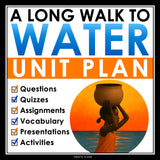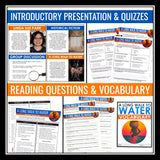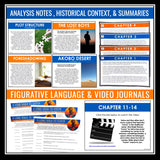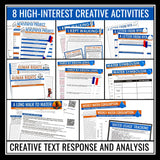A Long Walk to Water Unit Plan - Linda Sue Park Novel Study Reading Unit
This comprehensive unit plan includes everything you need to teach A Long Walk to Water with confidence and purpose. With over 250 pages and slides of engaging content, this ready-to-use resource will help your students explore the novel’s powerful themes and historical significance. From comprehension checks and vocabulary development to figurative language practice and literary analysis, each component is designed to foster meaningful learning while saving you hours of planning time.
Included in the A Long Walk to Water Unit Plan:
➡️ A Long Walk to Water Introductory Presentation: This 17-slide PowerPoint presentation is the perfect way to introduce A Long Walk to Water to your students. The slides build essential background knowledge on the Sudanese Civil War, the Lost Boys of Sudan, and the novel’s author, Linda Sue Park, while encouraging reflection and discussion through pre-reading questions and activities.
➡️ A Long Walk to Water Chapter Summary Cards: These 18 printable half-page cards break down the key events and themes in each chapter of A Long Walk to Water. They’re perfect for quick reference, text-based discussions, or supporting students who need help tracking plot developments across Salva’s and Nya’s narratives.
➡️ A Long Walk to Water Quizzes: Assess comprehension throughout the novel with four section-based quizzes, each including six multiple-choice questions and two short-answer quote analysis prompts. Detailed answer keys with explanations are included to support grading and class review.
➡️ A Long Walk to Water Video Clip Journal Prompts: Help students make meaningful text-to-self and text-to-world connections with these reflective video journals. Each short video relates to a major theme from the novel, such as perseverance, leadership, or access to clean water, and is paired with a thought-provoking writing prompt to deepen engagement and empathy.
➡️ A Long Walk to Water Vocabulary Booklet and Slides: Support vocabulary growth through context. Students encounter unfamiliar words in quotes from the novel, infer their meanings using context clues, and later confirm their definitions during class discussions or reviews using the included presentation slides.
➡️ A Long Walk to Water Questions and Answers: Guide students through each section of the novel with a mix of comprehension and analysis questions. This resource includes a student handout, response pages, and a presentation featuring text-based model answers to support both independent work and class discussion.
➡️ A Long Walk to Water Figurative Language Assignments: Students identify and analyze examples of figurative language (metaphor, simile, personification, alliteration, hyperbole, and onomatopoeia) drawn directly from the novel. Four print-ready assignments are organized by chapter section, with detailed answer keys for easy review.
➡️ A Long Walk to Water Historical Context Notes: This 27-slide presentation provides historical and cultural background essential to understanding A Long Walk to Water. Organized by chapter sections, it explores the Dinka and Nuer tribes, the Second Sudanese Civil War, refugee camps, and humanitarian efforts, and much more, helping students connect the novel to real-world events.
➡️ A Long Walk to Water Analysis Notes: This 36-slide presentation examines the novel’s literary elements, including theme, symbolism, conflict, tone, and characterization. Organized by chapter sections, these slides include important analysis notes from each section of the novel.
A Long Walk to Water Unit Plan also includes creative assignments and activities for each reading section. You can learn more about what's included below:
Chapters 1–5:
➡️ Water Crisis Lesson & Water Walk Challenge: In A Long Walk to Water, Nya’s daily walk for water reveals the harsh reality faced by millions around the world. In this multi-part activity, students learn about global water scarcity, track their own water use, participate in a Water Walk simulation, and take part in a Walk-A-Thon fundraiser to raise awareness for clean water access.
➡️ Water Symbolism Assignment: Water carries symbolic meanings throughout the novel, from survival and hardship to hope and transformation. In this activity, students analyze how the symbolism of water changes over the course of the novel by selecting key quotes and explaining what water represents in each moment.
Chapters 6–10:
➡️ Lost Boys of Sudan WebQuest: In this WebQuest, students explore the real events that inspired Salva’s story. Through videos, maps, and articles, they learn about the Lost Boys of Sudan, including their long journey across Africa, life in refugee camps, and resettlement in new countries. This background helps students better understand the historical and human context behind Salva’s experiences.
➡️ “Thirst” Nonfiction Response: Students read Kristin Lewis’s nonfiction article “Thirst” to explore the real-life story of Natalia, a 13-year-old girl from Mozambique whose struggle for clean water mirrors Nya’s in A Long Walk to Water. Through structured response questions, students compare both experiences, analyze the impact of contaminated water on their families, and reflect on the global significance of access to safe, clean water.
Chapters 11–14:
➡️ Human Rights Lesson & Analysis: This lesson challenges students to think critically about human rights and how they’re denied in times of war, poverty, and crisis. After studying the Universal Declaration of Human Rights, students connect its core principles to A Long Walk to Water, analyzing how Salva’s and Nya’s stories reveal violations of rights to safety, education, equality, and access to clean water.
Chapters 15–18:
➡️ Nya’s Letter to Salva Writing Activity: In this creative writing task, students take on Nya’s voice to write a reflective letter to Salva, connecting the novel’s dual narratives in a meaningful way. They may express gratitude, describe how access to clean water has transformed life in their village, and imagine Nya’s hopes for the future, strengthening empathy, voice, and understanding of the novel’s themes.
➡️ “I Kept Walking” – Salva Dut Speech Activity: After watching Salva Dut’s inspiring TED Talk, students reflect on the power of perseverance, hope, and leadership. Using discussion task cards, they analyze key quotes from his speech, connect his words to events in A Long Walk to Water, and respond to one prompt in depth, exploring how Salva’s message of “keeping walking” continues to impact lives today.
➡️ Front Page Newspaper Article Project: Stepping into the role of a journalist, students write a headline news story about Salva Dut’s inspiring work at the end of A Long Walk to Water. Using details and quotes from the novel, they craft a lead paragraph, supporting details, and a conclusion that highlight Salva’s achievements and the global impact of his well-building mission.
© Presto Plans
➡️ Want 10 free ELA resources sent to your inbox? Click here!








